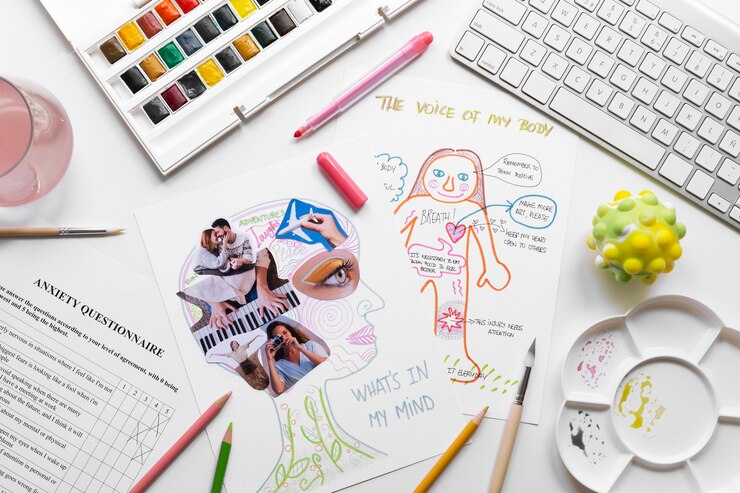
Adults aren’t the only ones who occasionally need a mental health day. Kids can also feel the pressure from schoolwork, social situations, and activities, which can become overwhelming without some downtime to recharge. In this guide, we’ll explore 10 mental health activities recommended by a professional to restore and emotionally balance your child.
**Table of Contents**
**”Even if I agree to give my child a mental health day, what can we do?”**
Many parents struggle with this question when considering giving their stressed or overwhelmed child a break from school and daily responsibilities. The good news is that the answer is simple and doesn’t require preparation or financial investment.
While your child might be tempted to binge on screen time, engaging in some of these mental health activities can make their break more effective, providing the emotional reset they need. Start the day with a conversation to set expectations and let your child help choose activities from the list below for a smoother path back to calm confidence.
These activities are backed by research and have a proven history of enhancing well-being.
**Related read>> 100 ways to boost mental health**
The best thing you can do for your child during a mental health day is to connect with them emotionally. This means giving them your full attention, truly listening to understand their thoughts and feelings, rather than just replying. A warm and responsive approach from parents fosters secure and trusting relationships, which supports a child’s emotional health. Studies have shown that such parenting can protect against stress.
**Pro Tip:** Connecting with younger children often happens through play and shared activities rather than direct conversation. Be mindful of when and how your child opens up.
Physical activity greatly benefits mental health. Moving the body helps process emotions and releases endorphins while reducing the stress hormone cortisol. Aerobic exercise, in particular, is as effective as medication or therapy for treating depression and anxiety and is a natural choice for children.
According to the American Psychological Association:
“On average, young people who exercise more have lower levels of depression, stress, and psychological distress, and higher levels of self-esteem, satisfaction with life, and overall well-being.”
**Pro Tip:** Invite your child to choose a physical activity they enjoy, giving them some control over their mental health day.
Life can sometimes feel like a treadmill, with one busy task after another. For your child to gain perspective, they need quiet time and space. During quiet periods, important brain regeneration and growth occur.
“Silence offers opportunities for self-reflection and daydreaming, activating various parts of the brain. It allows us to dial down inner noise, enhancing awareness of what matters most. It also encourages mindfulness—appreciating the present moment.” – Cleveland Clinic
**Pro Tip:** Simply provide your child with unstructured time to explore. It’s that easy.
Play is how children learn and relieve stress. It gives them control, as play is something done by choice. Fantasy play lets children create worlds with predictable outcomes. Control and predictability are key to reducing stress.
Megan Gunner, Ph.D., from the University of Minnesota, explains:
“Play is the best medicine in stressful times. It allows children a sense of control because play is what they engage in by choice.”
**Pro Tip:** Embrace play, even if it feels silly. Let your child lead for a change and see how it meets their needs for control.
**Related read>> 75 Calm Down Strategies for Kids (that Actually Work!)**
Journaling is a safe outlet for kids to express emotions. It helps them process feelings they might not feel comfortable voicing. Journaling offers a non-judgmental space for self-exploration, creativity, and setting goals.
Clinical Social Worker Yanique Chambers says journaling gives kids a place to explore their creative voice and resolve internal conflicts.
**Pro Tip:** Use emotion flashcards to inspire your child’s journal entries.
Art enables children to express feelings they might struggle to verbalize, while also encouraging emotional regulation and mindfulness. Through art, feelings and ideas become manageable.
Movement, color, and imagination help express emotions in a multi-dimensional way. – The Artful Parent
**Pro Tip:** Create an inviting art space for your child with a variety of tools to choose from.
Music therapy is often used in pediatric hospitals for a good reason. Music helps children learn self-regulation, rest, and relax. It can energize or calm them, assisting in mood management.
Nancy Kopman, an early childhood educator and composer, notes that music encourages children’s self-regulation, a crucial stress management skill.
**Pro Tip:** Explore relaxing playlists on Spotify or check out Nancy’s music collection for children.
A balanced diet can positively affect mood. By incorporating healthier, nutrient-rich foods during a mental health day, you might improve your child’s mood and habits.
What we eat affects our mood, and vice versa. Food is one of the most manageable risk factors for mental health issues.
**Pro Tip:** Cook a healthy recipe with your child and enjoy the benefits together.
**Related Read>> 75 Ways to Show Love to Your Child and Boost Their Self-Esteem**
Trying mindfulness activities with your child can shift their stress response to a calm, focused state. Mindfulness practices enhance focus, self-control, and overall well-being while reducing stress and anxiety.
**Pro Tip:** Use mindfulness tools to help your child stay calm and focused.
Finally, a mental health day is a perfect time to reflect on successes and challenges without the distractions of daily life. Planning and setting goals can help address areas of difficulty.
Teaching goal-setting promotes responsibility and a can-do attitude, forming a valuable lifelong habit.
**Pro Tip:** Utilize goal-setting resources to simplify this process for both you and your child.
Spending time outside has long been linked to reduced stress hormones and inflammation, lower blood pressure, and improved mood and anxiety levels. Nature offers numerous mental health benefits.
**Pro Tip:** Take an indoor activity outside—enjoy your lunch, read, or play a game in a natural setting.
Many assume childhood is all fun and joy, but mental health experts recognize the pressures kids face, from academics to social dynamics. These mental health day activities can offer the relaxation, reflection, and reset we all need.
Check out other articles in the series:
– Kids Need Mental Health Days- 9 Misunderstandings that Need Addressing
– 7 Signs Your Child Needs a Mental Health Day
Other parenting articles you might enjoy:
– 75 Awesome Calm Down Strategies for Kids
– The Best Mindset for Parenting a Spirited, Emotionally Intense Child
– 10 Insights of Remarkable Parents from a Family Therapist
– Easy Ways to Bond with Your Child
– 10 Everyday Ways to Improve Your Child’s Mood and Behavior
This post was originally published on 7/12/2021 and has been updated.



